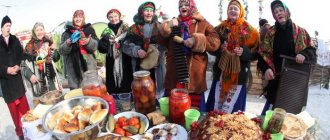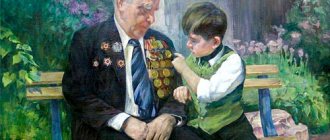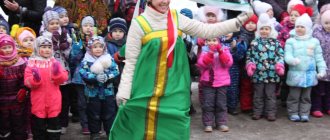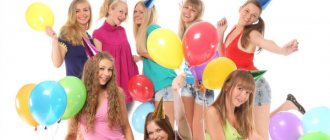Winter is already coming to an end, and spring is on the doorstep. And this is a wonderful event! At this time, our ancestors celebrated the real spring holiday of Maslenitsa. The tradition has remained to this day. Maslenitsa will begin next week.
This is a fun and large-scale holiday that is celebrated for a whole week. All the festivities this week are dedicated to the upcoming beautiful spring. What can you say about Maslenitsa for children? Let's talk about this holiday today.
A distinctive feature of the holiday is that the date of celebration changes every year. Maslenitsa week begins exactly 7 weeks before Easter, before the main fast of the year. Basically, Maslenitsa comes in February.
history of the holiday
Maslenitsa is the most ancient holiday brought into our culture by pagans. Our ancestors celebrated it since ancient times. Observant ancestors noted that at the end of winter, the days become longer, the sun shines brighter, and spring is about to come into its own, which means that nature will wake up again from a long winter hibernation. How could you not be happy? And so that winter would go away quickly and spring would become its full-fledged mistress, in honor of this they organized a whole festive week - Maslenitsa. At this time, winter was celebrated and sent to rest, and spring was invited and invited.
There is an interesting version of why the holiday has such a name: the name comes from the word “butter”, because at this time the body was already actively preparing for Lent, it was no longer possible to eat meat, but the consumption of butter and other dairy products was not forbidden.
The main traditions of Maslenitsa
Maslenitsa has always been celebrated very widely and cheerfully. The first three days were called “narrow” Maslenitsa, and from Thursday Maslenitsa was already called “wide”, all work stopped and festivities began. Each day of the week had a special name and had its own characteristics.
Monday “Meeting” - the beginning of the holiday, the beginning of cooking pancakes. Moreover, the first pancake was usually given to the church for commemoration of the dead, or to animals.
Tuesday “Flirting” - young people actively got to know each other and communicated with each other, rode down icy and snowy mountains, played games, invited each other over for pancakes.
Wednesday “Gourmand” - on Wednesday you had to eat enough pancakes to last for the whole year.
Thursday - “Revelry” - from this day the revelry grew, booths were already opening, people were riding sleighs, participating in games and fist fights.
Friday - "Mother-in-law's evening." The name speaks for itself. On this day we went to visit our mother-in-law to enjoy pancakes for warm family gatherings.
There was an interesting tradition on this evening of Maslenitsa. The son-in-law passed by his mother-in-law's house and looked at the windows. As soon as he sees a rag doll sitting on the window - a symbol of Maslenitsa, then he boldly comes to visit and treats himself to pancakes. This was how the woman showed that everything was ready and she was waiting for guests.
Saturday – “Sister-in-Law’s Gatherings.” The mother-in-law came to visit the newlyweds for pancakes.
Sunday - Forgiveness Sunday. The most fun and eventful day of Maslenitsa week. Firstly, they asked each other for forgiveness for all offenses, and they themselves forgave. Secondly, we walked on the city streets until we dropped. And the most interesting thing is that at the end of the day, an effigy of Maslenitsa was burned in the fire. It was believed that this was how they cajoled winter, as if persuading it to give way to a warm spring.
When does Maslenitsa 2022 start?
Maslenitsa is not celebrated on a specific day; the holiday falls on a different date each year. The date of Maslenitsa is calculated as follows: another 56 days are subtracted from the day of Orthodox Easter. In 2022, the date of Maslenitsa itself falls on March 14 , coinciding with the onset of the second week of calendar spring. Accordingly, Maslenitsa week begins earlier - March 8 , International Women's Day.
Days of Maslenitsa week
Every day of Maslenitsa is special. It only seems that unbridled fun continues all week - in fact, every day on the eve of a long fast is dedicated to its own rituals and traditions.
- First day (Monday) – Meeting. Day of the first pancake: on Monday the first pancake is baked and given to the poor or simply left on the windowsill. And on the day of the Meeting, women in Rus' taught their daughters to bake pancakes - this tradition can be observed in modern conditions.
- Second day (Tuesday) - Flirting. The day when young people looked closely at each other, choosing a suitable pair. Guys and girls decided on their future couple by going down the slides together and having common holiday dinners.
- The third day (Wednesday) - Gourmand. The very day from which the popular expression “to the mother-in-law for pancakes” came from. On Wednesday, sons-in-law went to treat their mother-in-law, and it was believed that the richer the mother-in-law set the table, the better she treated her daughter’s husband.
- Fourth day (Thursday) - Revelry. A day that fully lives up to its name - on Razgul in Rus', both adults and children had fun: they rode in sleds, danced in circles, played snowballs and captured snowy towns.
- Fifth day (Friday) - Mother-in-law's evening. Mothers-in-law paid a return visit to their sons-in-law; the host's duty was to treat the mother-in-law and other guests whom she wished to invite. The tradition has served and can continue to serve to strengthen the relationship between the two families.
- Sixth day (Saturday) - Sister-in-law's gatherings. The husband's sisters came to visit their daughter-in-law, who was supposed to bake pancakes for the girls. It was considered indecent to come empty-handed on this day - sisters-in-law gave their brother’s family a good gift.
- Seventh day (Sunday) - Farewell. On the last day of Maslenitsa, it is customary to ask for forgiveness from loved ones and remember the departed. But the festivities still continue: with round dances, dancing and sledding. The last symbol of farewell to Maslenitsa - the burning of an effigy - occurs on the seventh day of Maslenitsa week.
How to spend Maslenitsa with children
Children simply adore Maslenitsa, because something incredible happens for seven whole days. This includes walking, baking pancakes, visiting people, and many other entertainments. If you want to celebrate Maslenitsa with your children in a fun and big way, here are some great tips.
Go to a museum or exhibition, usually at this time there are interactive excursions and thematic exhibitions there, this will help you tell more about the holiday or further deepen your existing knowledge.
There's nothing better than cooking together, especially when it's delicious, everyone's favorite pancakes. You can use a traditional recipe or an old one depending on your preference. And there are countless fillings for them. Jam, sour cream, fish and caviar are considered traditional.
My own pancake recipe, “packed in a fairy tale,” can be read and used with children in the fairy tale “Masleniny pancakes.”
Invite guests, learn poems and songs about Maslenitsa, organize a children's holiday with active fun, songs and dances.
Don’t forget about creativity - together with your child, make a scarecrow of Maslenitsa from available straw, ropes, sticks, paper, fabric, etc. Among the crafts for Maslenitsa you can make suns, pancakes, and rag dolls. Some of our Maslenitsa creative crafts can be seen in this article.
Be sure to go to folk festivities on the very last day of Maslenitsa, ride a horse cart, take part in games and fun, show your child how the effigy of Maslenitsa is burned at the very end of the holiday.
Another article about how to spend Maslenitsa with children.
Interesting facts about Maslenitsa
- There is a similar holiday not only in Rus'. In Europe, it is celebrated on approximately the same dates, but it is called carnival, which literally means “goodbye, meat,” and it is also timed to coincide with the beginning of Lent.
- Maslenitsa is the only holiday that the Russian Orthodox Church adopted from paganism. Maybe they just haven’t come up with an alternative, or maybe just an exception to the rule. The main thing is that we still celebrate this original and fun holiday.
- As you know, pancakes are baked all over the world for Maslenitsa. Of course, every year the best chefs want to surprise with something. For example, in 1994, the largest pancake in history was baked in England - its diameter was 15 meters and its height was as much as 1.5 cm. The total weight was 3 tons. Damn it!
- Until the beginning of the 17th century, Maslenitsa was celebrated not for 7, but for 14 days! The people knew how to have fun even in troubled, difficult times.
Maslenitsa is a fun holiday that is celebrated on a special scale. How can we do without interesting active games? Below you will find traditional games for children for the most active and eventful holiday celebrations.
"Sunny Round Dance" for the little ones
The baby stands in a circle and joins hands, and the leader stands in the center and personifies the sun. The guys walk in a circle, holding hands, and sing:
Shine, sun, brighter - Summer will be hotter, And winter will be warmer (the circle is shrinking), And spring will be sweeter (the circle is expanding).
Suddenly the presenter loudly says “I’m burning!”, and the children scatter in different directions. The leader's task is to catch someone! Whoever he catches becomes the next sun. The game starts over.
"Burners"
The guys find a mate and stand in a column as if by a stream. At the head of the column is the leader. Everyone sings a song in chorus:
Burn, burn clearly, so as not to go out! Look at the sky, The birds are flying, The bells are ringing: Ding-dong, ding-dong, Run out quickly!
As soon as the song ends, the first couple must run very quickly to the end of the column before the leader catches them. At this time, the others encourage the participants with the words:
“One-two, don’t be a crow, but run like fire!”
If the leader catches someone, he stands in a column with the caught one, and the one left without a pair takes the place of the leader. The game starts again.
"Taking the Snow City"
This is another traditional Maslenitsa game. Participants are given exactly 30 minutes to build a snow fort. After this the assault begins. It is usually difficult to determine the winner, but, as they say, the main thing is not victory, but fun and active participation.
"King of the Hill"
A simple and interesting game. Participants stand at the foot of the mountain and, on command, begin to climb up. The winner - the king of the mountain - is considered to be the one who climbed to the very top the fastest.
How to celebrate Maslenitsa with your children
You can celebrate Maslenitsa with your child so that he will forever remember what the holiday is dedicated to and the customs associated with it. Before you go to the mass celebrations, tell your children about the history of Maslenitsa - the story can be supplemented with Russian folk poems and songs dedicated to Maslenitsa.
Speaking of festivities, check to see if your city hosts children’s programs dedicated to seeing off winter. If there are no events for children, perhaps you should refuse to attend a general holiday, where drunk people will probably be present.
To avoid losing your child in the crowd at mass celebrations in honor of Maslenitsa, install the “Where are my children” application. With it you can accurately track the child’s location and route, quickly contact if necessary and listen to what is happening around!
You can have a fun Maslenitsa with your child without attending a city festival: bake pancakes together, make a scarecrow figurine, play on the street and invite guests to Maslenitsa pancakes.
In kindergarten
You can introduce children to beautiful Russian rituals from a very early age - even kids will remember this interesting holiday, and Maslenitsa will not become for them just a day when they are supposed to eat pancakes.
Every day of Maslenitsa week in kindergarten can be made special by telling in an accessible way about the history and traditions of Maslenitsa. An approximate holiday plan is in the table below:
| Monday (Meeting) | Tuesday (Flirting) | Wednesday (Gourmet) | Thursday (Razgulyay) | Friday (Broad Maslenitsa) |
| Making dolls with your own hands from straw, twigs, shreds. | Making crafts in the shape of the sun, round dances. | Drawing pancakes and an exhibition of the resulting drawings. | Outdoor games, introduction to carols. | Songs, dances, round dances, pancakes. |
At school
Maslenitsa is an emotional holiday, in which there is a competitive spirit, and schoolchildren are willingly involved in organizing the farewell to winter.
With small children - primary and secondary students - it is better to celebrate the holiday within the walls of the school. How to celebrate Maslenitsa in the classroom:
- prepare the room: make room, decorate the classroom with balloons, crafts in the shape of pancakes and the sun;
- show invited parents a performance - theatrical or puppet - according to a pre-rehearsed script;
- arrange a tea party and entertainment with dancing, games and competitions.
After the holiday is over, you can play in the school yard and go down the slides.
It will be more interesting for high school students to celebrate outside of school: parents can organize a trip for adult children to a cafe that serves pancakes. After hanging out together, the guys will probably linger longer - they’ll want to go down the slides or just take a walk. Make sure your child's phone or smartwatch is charged in advance - and don't worry unnecessarily.
Haven't gotten yourself a smartwatch with GPS yet? Order them right now and have peace of mind for your child throughout the holidays - know where he is and what is happening around him! Official smartwatch store.
Maslenitsa game ideas for children
As you bid farewell to the winter, you can teach your children to play ancient, almost forgotten games. For example, in these:
- “Burners”: children stand in a “stream”, the driver’s task is to catch one of the first pair running away, the one who did not get a pair continues to drive;
- “Sun”: the driver in the center depicts the sun, the rest of the children dance around it, narrowing and expanding the circle, on the fourth round the driver says “I’m burning!” and tries to catch one of the players;
- “King of the Hill” is perhaps the most fun winter game in the fresh air: one child climbs onto a snow mound and announces that he is the king of the mountain, the task of the other children is to pull the “king” off the mountain and take his place.
Ideas for Maslenitsa competitions for children
On Maslenitsa you can play fun outdoor games with your children in the classroom or on the street:
- tug of war is the most popular Maslenitsa pastime: the guys are divided into two teams, a line is drawn in the middle between them, and the task of each team is to pull the rope towards themselves. The team whose member crossed the line loses;
- “Bathhouse” - for the game you will need small brooms, which you can make yourself during technology lessons from branches and colored paper: the task of each team is to beat colored paper decorations from their brooms onto the backs of their opponents;
- “On three legs”: children are divided into pairs, the right leg of one of the pair and the left leg of the second are tied, and in this way the participants get to the established line and return. The fastest pair wins;
- “Jump rope” - for the competition you will need two adult participants: adults twist the rope, children take turns jumping over it. The one who has jumped the most times wins;
- “Balloon fight” is a safe analogue of fist fights: children from two teams are given balloons on long handles, and they fight with these “swords” until all the balloons of one of the teams burst.
Proverbs and sayings about Maslenitsa
The people came up with many wise proverbs and sayings about the festive Maslenitsa. Here are just some of them:
- “A pancake is not a wedge, it won’t split your stomach”
- “Maslenitsa is not all for the cat, there will be Lent too”
- “Not life, but Maslenitsa”
- “Maslenitsa – go crazy, save money”
- “At least pawn everything from yourself and celebrate Maslenitsa”
- “So that you are up to your elbows in trouble, and so that you get your fill of food”
Poems about Maslenitsa
A lot of poems have been written about Maslenitsa. Unfortunately, the authors of most of them are unknown. But on the other hand, in such a rhymed and rhythmic form, getting to know the holiday is even brighter and more fun. These poems are a kind of melodies and barkers)))
* * *
Hello, annual Maslenitsa, our dear guest! Come on black horses, On painted sleighs, So that the servants will be young, They will bring us expensive gifts, And pancakes, and kalachi Swords through our window!
* * *
And we were expecting Maslenitsa, We were greeting our dear guest, We were covering the mountain with pancakes, And we were pouring butter on top. The mountain is steep like pancakes, the mountain is clear like butter, And they pour snow on the mountain, And our mothers call us home. It’s not good for us to go home, We decided to take a ride down the mountain. Oh, you Maslenitsa-crooked neck, give us a good ride.
* * *
This is Maslenitsa - a fairy who walked around houses and courtyards. So let's quickly accept her gifts! And she gives you happiness. Many victories in life, getting rid of bad weather, and letting good luck follow! We are waiting for you at Maslenitsa! We'll meet you with butter pancakes, cheese, honey, kalach and cabbage pie. Great Lent awaits us all, Eat for future use, people! Walk all week, eat up all your supplies.
* * *
Wide Maslenitsa! We boast about you, we go on roller coaster rides, we overeat on pancakes. Hey, Maslenitsa Kuroseika, give us a good ride! - Oil can, Oil can, haven’t you seen Gorasenka? - And Goraska in a red hat on a little black horse, waves her whip, and the horse dances under him.
* * *
Winter is not living its last days alone: We all see it off, We wish you a year’s rest! And now we are waiting for spring - its traces are already visible! Let it warm you and me. Happy Maslenitsa! And Happy Spring!
DIY costume for Maslenitsa
Spectacular and easy-to-make costumes for Maslenitsa - buffoon for boys and Spring for girls.
How to make a buffoon costume with your own hands:
- A colorful women's robe that fits in size is cut off from the bottom and hemmed - it turns out to be a future shirt for the buffoon.
- Slits are made on the sleeves of the shirt so that the sleeves hang down a little.
- The lower part of the costume is made from pants that are too big for the child, sewing in an elastic band at the waist.
Creating a headdress for a costume is also quite simple; watch the master class on making a hat for a buffoon with your own hands here:
How to make a Spring costume for a girl:
- Choose a flared dress in a suitable color - preferably green.
- Glue or sew paper or fabric flowers onto the dress.
- Place beads on the girl’s neck and a wreath on her head.
A beautiful wreath of artificial flowers can be made like this:
If you have no free time at all, but want to make a costume with your own hands, choose one of the simplest options:
- Spring look for a girl: over any spacious flared sundress, wear a tight, fitted sleeveless vest;
- bear costume for a boy: put a fur coat on your child turned inside out and complete the look with a bear mask;
- goat costume: attach beads and bells to the fur coat, make horns from cardboard.
You can create an image suitable for Maslenitsa even simpler: put on a boy any mask or false beard, and add themed accessories to the girl’s regular clothes, for example, a bright scarf, a sash, or beads made from bagels.
Riddles about Maslenitsa
And without fun riddles on a holiday, you can’t go anywhere. Give your children these riddles at the beginning of Maslenitsa week and set the rhythm for the whole holiday.
We say goodbye to winter, And we bake and eat pancakes, We greet spring together, What are we celebrating? (Maslenitsa)
Drive away the snowstorms from us, Take us on a carousel. Melt the cold ice, Let spring come soon! (Maslenitsa)
On this holiday, everyone strives, Not to sit at home for a long time, But everyone rushes to the fair, To watch performances, Buffoons perform, They bake delicious pancakes, Once a year there is a holiday, At the end of winter. (Maslenitsa)
This is a very tasty holiday, Gives us pancakes with caviar, And also delicious jam, What kind of holiday is this? (Maslenitsa)
Everyone around is baking pancakes, They give us plenty to eat, We burn the effigy of winter, And we invite spring to come to us. (Maslenitsa)
Fairs, smiles, songs, All the people are resting, There is no time more delicious, more wonderful, Everyone is looking forward to spring! Samovars and bagels, But most importantly, pancakes, Everyone is dancing, having fun, Come on, call it a holiday! (Maslenitsa)
My holiday Only once a year I will come to you for a week. I will bring joy to everyone and treat them to pancakes. (Maslenitsa)
On Holy Sunday, we all have to ask everyone for forgiveness and answer: ... (“God will forgive!”)
I'll meet you on Monday and play on Tuesday. On Wednesday I will treat you all. Wednesday is a treat for everyone. And on Thursday there is revelry for everyone. On Friday I’ll go to my mother-in-law, and on Saturday I’ll go to my sister-in-law. On Sunday I forgive everyone and treat them to pancakes. How can you see me off? There is a post already at the yard. (7 days of Maslenitsa)
We rest all week and treat everyone to pancakes. We bid farewell to the cold of winter, and welcome spring with warmth. (Maslenitsa)
Maslenitsa is a delight! We bake pancakes in the morning. They come with butter and jam. Well, maybe... (Caviar)!
You can’t do without it, so that the pancakes are all successful, the dough, before kneading, you need to buy it, this product is given by the cow, it glitters in the sun. It improves the taste of pancakes and is kept in the refrigerator. (Oil)
What kind of place would you say, what to call it, friends? It’s like in a fashion store, You can always buy everything, There are counters and display cases, They have sellers, Once a year they come out to sell souvenirs. (Fair)
Gourmand Wednesday is coming soon! It won't be difficult for us! We are faithful to traditions - We are going to... (Mother-in-law for pancakes)!
Riddles about pancakes
The grandmother baked napkins for the children, and the napkins made from flour turned out thin. The naughty grandchildren know that those napkins... (pancakes)
Yellow, round, fragrant and tastes so good! As soon as mom bakes it, he jumps straight into his mouth! (Crap)
They are not easy to prepare: Eggs, salt and milk, Sugar, yeast and flour - Everything is lightly beaten with a wooden round pestle into a liquid raw dough. Bake in a frying pan - Drizzle with sweet honey or sprinkle with cheese. Appetizing (Pancakes) will be delicious with butter
And we met Maslenitsa, filled the mountain with cheese, poured oil on the mountain, invited us to the wide yard. (Pancakes)
It has a round shape, yellow color is inherent in it, it warms your hands on Maslenitsa, it tastes very sweet. (Crap)
It lies in front of me, doused with sour cream! I love him, I won’t hide it! How the sun shines! I’ll only tell my mother: “I’ll eat it - not alone!” And I’ll share it with my friends. I’m the most delicious... . " (Crap)
We lived in a cramped saucepan, then we were suddenly scooped up. They poured it out, turned it over and put it on the table in a pile to stand later. They poured oil on it and sprinkled it with sugar. We taste delicious with sour cream. Fragrant... (Pancakes)
For even more riddles, see the “Children’s Riddles” section.
Songs for Maslenitsa
Happy Maslenitsa week. And it’s rich not only in games, but also in treats. Many songs are written about Maslenitsa, they lift your spirits and remind you of spring...
Oh, pancakes, pancakes, pancakes
(Russian folk song)
We haven’t eaten pancakes for a long time, We wanted pancakes,
Oh, pancakes, pancakes, pancakes, you are my pancakes. Oh, pancakes, pancakes, pancakes, you are my pancakes.
Our elder sister is a master at baking pancakes.
Oh, pancakes, pancakes, pancakes, you are my pancakes. Oh, pancakes, pancakes, pancakes, you are my pancakes.
She baked some food, there are probably five hundred.
Oh, pancakes, pancakes, pancakes, you are my pancakes. Oh, pancakes, pancakes, pancakes, you are my pancakes.
She puts it on the tray and carries it to the table herself.
Oh, pancakes, pancakes, pancakes, you are my pancakes. Oh, pancakes, pancakes, pancakes, you are my pancakes.
Guests, be healthy, my pancakes are ready.
Oh, pancakes, pancakes, pancakes, you are my pancakes. Oh, pancakes, pancakes, pancakes, you are my pancakes.
Maslenitsa
Music by: Trubachev
We greet Spring with crispy pancakes, we burn the effigy of Winter, we sing in a round dance.
Hello, dear Spring, We are neighbors with you. Hello, Red Spring, We greet you! Hello, Red Spring, We welcome you!
We will glorify Spring with fragrant pancakes. Everything in nature comes to life, the cunning sun blinks.
I'll warm you up more - A stream will run down the mountain. I will rise higher, Hello, Red Spring! I will rise higher, Hello, Red Spring!
Spring was called
Performed by "Wizards of the Courtyard".
He didn’t call for winter, the cold, he didn’t call, she came herself, Weaving her laces, sweeping them, chalking them. And we look from the window, And we are waiting for spring and the sun.
They called for spring, waited for summer, The river froze, houses under the snow. They called for spring, they waited for summer, It’s on the threshold, leave us, winter.
Winter, winter. Winter.
Let's go to round dances, we will call for spring, Drops are singing outside the window, Hello, sunny April. And we are waiting for spring, the magician, And we are building a staircase to heaven.
They called for spring, waited for summer, The river froze, houses under the snow. They called for spring, they waited for summer, It’s on the threshold, leave us, winter.
Winter, winter. Winter.
They called for spring, waited for summer, The river froze, houses under the snow. They called for spring, they waited for summer, It’s on the threshold, leave us, winter.
"The pancakes are good"
Author of poetry and music: Pavel Ermolaev Performed by: ensemble “Lel”
My girlfriend and I were invited to a fun holiday. We took part in quizzes and crossword puzzles. And when we got hungry, what did we see? How did your favorite pancakes appear on sale?
Chorus:
Pancakes, pancakes, good pancakes Pancakes, pancakes, nice pancakes Pancakes, pancakes, rosy pancakes With butter, honey and strawberries, and even with bananas.
I remembered this day with my girlfriend. Time flew by quickly, we were not bored. And we really liked everything about this holiday. Because they sold pancakes and butter.
Chorus.
We led round dances, played streams, accordionists played merrily for the people, everyone looked at the tables and clapped their hands, and when they finished playing, they devoured all the pancakes.
Chorus.
Crafts for Maslenitsa
The most popular craft for Maslenitsa is, of course, a stuffed animal. It may be difficult for small children to make a stuffed animal - with kids it is better to make a talisman doll or a sun.
How to make a scarecrow for Maslenitsa - step-by-step instructions
Nail two wooden sticks (one longer, the other shorter) to each other to form a cross - this will be the basis for the scarecrow.
- Tie the resulting figure with straw.
- Make the head from crumpled newspapers, cotton wool or dry grass, wrap the resulting round shape with a bright scarf or a suitable piece of fabric.
- Make a face for the scarecrow: mark the eyes with buttons, the mouth, nose and cheeks with red lipstick.
- Tie the finished head tightly to the craft figure.
- Dress the stuffed animal in old clothes.
A slightly more complex option for creating a scarecrow:
How to make a talisman doll - step-by-step instructions
Take a piece of fabric measuring 20 by 20 cm, place a small piece of tightly rolled cotton wool in the center of the fabric;
- Fold the fabric evenly diagonally.
- Using a long thread of the same color as the fabric, form the doll’s head: wrap a piece of cotton wool several times and secure with a knot (the main function of the doll is to protect the owner, so make the number of wraps even), do not cut the thread.
- Using your hand, form the waist and wings of the craft, bring the thread to the front of the doll, wrap the waist crosswise several times, and secure with a knot.
- You can use a thread of a different color to make a halo for the doll.
Another option for making a talisman doll:
How to make sunshine with your baby on Maslenitsa - step-by-step instructions
- Draw an even circle on a piece of thick white cardboard.
- Make the sun's face: draw with pencils, finger paints, or use Easter products - stickers, safe dyes.
- Cover empty spaces on the sheet with glue.
- Immediately add millet before the glue dries.
- Wait for the glue to dry and shake off any excess millet.
You can also make the sun like this:
Become your child's best playmate: play together in the yard, take part in competitions, bake pancakes for the whole family. Do not doubt - your children will remember the unusual holiday, and in the future they will preserve the tradition of celebrating Maslenitsa in their families.
2









